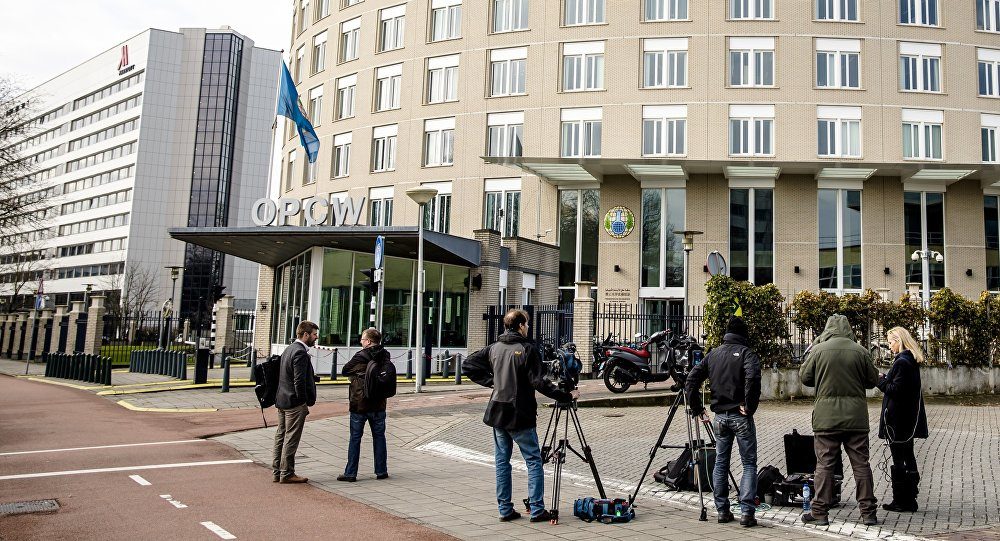Kommentar: Delvist oversat af Sott.net fra Tinkering with the OPCW to help support specious Western narratives: OPCW wins new powers to undermine authority of UN Security Council Oversættes titlen til dansk i sin helhed, bliver det "Justering af Organisationen for forbud mod kemiske våben for at hjælpe med at støtte Vestens tvivlsomme fortælling: Organisationen opnår ny magt til at underminere FN's Sikkerhedsråds autoritet."
I den virkelige verden udtaler politiet sig almindeligvis ikke straks om, hvem der har begået en forbrydelse. Indicier samles, og bruges i en retssag, hvor en eventuelt mistænkt først dømmes efter, at det er vist, at vedkommende med stor sandsynlighed har begået forbrydelsen. Læs mere om udviklingerne i afsnittene nedenfor.
On June 27, an OPCW special session held in the Hague, the Netherlands, voted to expand the powers of the international chemical weapons watchdog. It was only the fourth conference held by the organization in its 21-year history and the first gathering to address the problem of the non-attribution of responsibility for the use of CW.
A total of 147 countries were accredited to join the session. Forty-six nations did not take part for various reasons. A two-thirds majority, minus any abstentions, was required for the proposal to be approved. The vote was 82-24 - only 106 out of 193 voted, leaving 87 (or 45% of all OPCW members) aside. It passed in accordance with the rules but was far from being very convincing overall! When you add 24 to 87 you get 111 members out of 193 who did not approve the decision. This was no great victory.
UK Foreign Minister Boris Johnson put forward the proposal in order to give the organization some teeth. The UK government thinks the OPCW must adopt a higher profile, which would include the authority to identify the perpetrators, otherwise it will lose its relevance. The powers of attribution that are to be used initially in Syria will be strengthened and expanded at a later special conference in six months.
The proposal submitted by the UK had the backing of the United States, the European Union, and other nations under their influence. From the very beginning the British initiative was supported by the secretariat of the OPCW. It's no wonder, as it caters to the interests of bureaucrats. Their clout and salaries will grow. A host of countries, including Russia, opposed the move. Moscow believes that the result of the vote places the organization's future in doubt.
In a nutshell, the approved proposal will turn that body into a political tool to be used to undermine international security, because it encroaches on the exclusive prerogatives of the UN Security Council. The OPCW was not created to carry out the functions of prosecutor and international police. In Syria, the organization has not done its job efficiently, often failing to gather evidence at the site and using untrustworthy sources of information while preparing its reports. For instance, violations of the core principle of Chain of Custody and many provisions of the CWC took place last year during the investigations of the Khan Sheikhoun chemical attack, during which the inspectors did not travel to inspect Syria's Shayrat air base. The same story was repeated during the 2018 attack in Douma. The investigation was poorly conducted. There were serious disagreements between member states, which prevented that body from reaching definitive conclusions.
The performance of the OPCW has so far not been up to par, so why should its authority be expanded, making it responsible for such a complicated task as assigning blame? The OPCW is not a court. Its inspectors are not trained to be judges. If the OPCW can hand down guilty verdicts, then what do we need international tribunals and other bodies for?
The British proposal did not even offer to reform the organization before assigning it a new mission. No details were provided as to how to ensure transparency and impartiality. If the OPCW is to make final conclusions on guilt, it should have a mechanism to prevent its being politicized and biased. It all goes to show that political motives prevailed when the initiative was put forward. Many nations don't care much about the Skripal case but they will vote to put the blame on Russia in order to curry favor with the UK and its allies. Many of them see the events in Syria as a far-off problem. They will also vote to please those who hold influence over them. A country can be blamed without hard evidence presented.
Comment: Which brings up this article (timing?): White House says Syria planning "another" chemical attack: Is U.S. planning another false flag?
Nice words were uttered condemning the use of CW, and highfalutin speeches were given to play on people's heartstrings, but not all that glitters is gold. Quite often decisions approved by a relative majority are dictated by emotions, not wisdom. Many aspects of the matter had not been clarified, a lot of questions were still unanswered, and some topics that cried out for a thorough discussion had simply been swept under the rug. As a result, a very important international body has been turned into a tool for playing political games instead of doing the job it was initially created for. It may come to conclusions and point its finger at culprits, but will it enjoy a high level of trust? That's what leaves us with a lot of doubts.




Kommentar: A separate article from a few days ago also has a look at the OPCW's newly granted empowerment:
OPCW agrees to expand role and attribute blame for Syrian chem attacks
Example from Khan Sheikun:
Khan Sheikhun False Flag: Chlorine, not Sarin